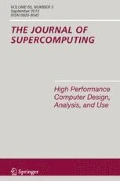Abstract
The Turn model routing algorithms for mesh interconnection network achieve partial adaptivity without any virtual channels. However, the routing performance measured by simulations is worse than with the simple deterministic routing algorithm. Authors have explained these results simply by uneven dynamic load through the network. However, this phenomenon has not been studied further.
This paper investigates performance degradation with Turn model and drawbacks of partially adaptive routing in comparison with the deterministic routing, and it introduces some new concepts. Our simulations deal with individual channels and results are presented by 3D graphs, rather than by commonly used averages. An additional parameter—channel occupation, which is consistent with queuing theory commonly used in many proposed analytical models, is introduced. We also propose a new structure, the Channel Directions Dependency Graph (CDDG). It provides a new approach in analysis, helps in understanding of dynamic routing behaviour, and it can be generalized in other routing algorithms.
Similar content being viewed by others
References
V. S. Adve and M. K. Veron. Performance analysis of Mesh interconnection networks with deterministic routing. IEEE Transactions on Parallel and Distributed Systems, 5(3):225–246, 1994.
A. Agarwal. Limits on Interconnection network performance. IEEE Transactions on Parallel and Distributed Systems, 2(4):398–412, 1991.
R. V. Boppana and S. Chalasani. A comparison of adaptive wormhole routing algorithms. In Proceedings of the 20th International Symposium on Computer Architecture, pp. 351–360, ACM Press, New York, NY, 1993.
B. Ciciani, M. Colajanni, and C. Paolucci. Performance evaluation of deterministic wormhole routing in k-ary n-cubes. Parallel Computing, 24:2053–2075, 1998.
G. M. Chiu. The odd-even turn model for adaptive routing. IEEE Transactions on Parallel and Distributed Systems, 11(7):729–738, 2000.
R. Cypher and L. Gravano. Storage-efficient, deadlock-free packet routing algorithms for Torus networks. IEEE Transactions on Computers, 43(12):1376–1385, 1994.
W. J. Dally and C. L. Seitz. Deadlock-free packet routing in multiprocessor interconnection networks. IEEE Transactions on Computers, 36(5):547–553, 1987.
W. J. Dally. Virtual-channel flow control. IEEE Transactions on Parallel and Distributed Systems, 3(2):194–205, 1992.
J. Duato. A new theory of deadlock-free adaptive routing in wormhole networks. IEEE Transactions on Parallel and Distributed Systems, 4(12):1320–1331, 1993.
W. C. Feng and K. G. Shin. Impact of selection functions on routing algorithms performances in multicomputer networks. In Proceedings of the 11th International Conference on Supercomputing, pp. 132–139, ACM Press, New York, NY, 1997.
S. Gajin. Adaptivity Analysis of the Turn Model in Multicomputers. Master thesis, Faculty of Electrical Engineering, University of Belgrade, 1999.
C. J. Glass and L. M. Ni. The Turn Model for adaptive routing. In Proceedings of the 19th International Symposium on Computer Architecture, pp. 278–287, ACM Press, New York, NY, 1992.
L. Gravano, G. D. Pifarré, P. E. Berman, and J. L. C. Sanz. Adaptive deadlock- and livelock-free routing with all minimal paths in Torus networks. IEEE Transactions on Parallel and Distributed Systems, 5(12):1233–1251, 1994.
J. D. Shih, Fault-tolerant wormhole routing for hypercube networks. Information Processing Letters, 86:93–100, 2003.
A. Khonsari, H. Sarbazi-Azad, and M. Ould-Khaoua. An analytical model of adaptive wormhole routing with time-out. Future Generation Computer Systems, 19:1–12, 2003.
L. Kleinrock. Queuing Systems: Theory, Vol. 1, Wiley, New York, 1975.
Y. Lan. An adaptive fault-tolerant routing algorithm for hypercube multicomputers. IEEE Transactions on Parallel and Distributed Systems, 6(11):1147–1152, 1995.
S. S. Lam and M. Reiser. Congestion Control of store-and-forward networks by input buffer limits—an analysis. IEEE Transactions on Communications, 27(1):127–133, 1979.
M. Ould-Khaoua. Message latency in the 2-dimensional mesh with wormhole routing. Microprocessors and Microsystems, 22:509–514, 1999.
G. D. Pifarré, L. Gravano, S. A. Felperin, and J. L.C. Sanz. Fully adaptive minimal deadlock-free packet routing in hypercubes, Meshes, and other Networks: Algorithms and simulations. IEEE Transactions on Parallel and Distributed Systems, 5(3):247–263, 1994.
H. Sarbazi-Azad. A mathematical model of deterministic wormhole routing in hypercube multicomputers using virtual channels. Applied Mathematical Modelling, 27:943–953, 2003.
H. Sarbazi-Azad, M. Ould-Khaoua, and L. M. Mackenzie. Analytical modelling of wormhole-routed k-ary n-cubes in the presence of matrix-transpose traffic. Journal of Parallel and Distributed Computing, 63:396–409, 2003.
L. Schwiebert. A performance evaluation of fully adaptive wormhole routing including selection function choice. In 19th IEEE International Performance, Computing, and Communications Conference, pp. 117–123, 2000.
A. Shahrabi, L. M. Mackenzie, and M. Ould-Khaoua. An analytical model of wormhole-routed hypercubes under broadcast traffic. Performance Evaluation, 53:23–42, 2003.
J. Upadhyay, V. Varavithya, and P. Mohapatra. A traffic-balanced adaptive wormhole routing scheme for two-dimensional meshes. IEEE Transactions on Computers, 46(2):190–197, 1997.
Author information
Authors and Affiliations
Corresponding author
Rights and permissions
About this article
Cite this article
Gajin, S., Jovanović, Z. Explanation of Performance Degradation in Turn Model. J Supercomput 37, 271–295 (2006). https://doi.org/10.1007/s11227-006-6454-y
Issue Date:
DOI: https://doi.org/10.1007/s11227-006-6454-y




